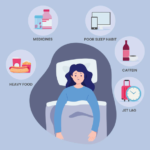There are many health issues that can be connected to poor eating habits. Here are five of the most common:
1. Obesity
One of the most well-known health issues associated with poor eating habits is obesity. When people eat unhealthy foods high in sugar, fat, and salt, it can lead to weight gain. The Centers for Disease Control and Prevention (CDC) reports that obesity is one of the leading causes of preventable death in the United States.
2. Diabetes
Another major health issue that can be linked to poor eating habits is diabetes. Diabetes is a disease that affects the way the body uses glucose, a type of sugar. When someone has diabetes, their blood sugar levels become too high. This can lead to a number of health complications, including heart disease, stroke, and kidney disease.
3. Heart Disease
Unhealthy eating habits can also lead to heart disease. Heart disease is a condition that affects the heart and blood vessels. It is the leading cause of death in the United States. Eating foods that are high in saturated fat and cholesterol can increase a person’s risk of heart disease.
4. Stroke
Another serious health complication that can be caused by poor eating habits is stroke. A stroke is a condition in which the blood supply to the brain is interrupted, causing the brain cells to die. Stroke can occur when a blood clot blocks the flow of blood to the brain or when a burst blood vessel causes bleeding in the brain.
5. Cancer
Cancer is a disease that occurs when cells in the body become abnormal and divide uncontrollably. There is no one cause of cancer, but diet and lifestyle factors can play a role. Eating unhealthy foods can increase a person’s risk of developing certain types of cancer, such as cancer of the breasts, colon, kidneys, and lungs.
Healthy food is important for the overall well-being of our bodies. Junk food, on the other hand, does the complete opposite, leading to health problems and weight gain.
What is healthy food?
Healthy food is defined as food that is nutritionally dense and provides our body with essential vitamins, minerals, antioxidants, and phytonutrients. These nutrients are essential for the optimal function of our body and help to protect us against chronic diseases.
What is junk food?
Junk food is generally defined as food that is high in calories, unhealthy fats, sugar, and salt, and is low in nutritional value. It is often processed and contains artificial ingredients, flavors, and colors. Junk food is devoid of any nutritional value and can lead to weight gain and health problems.
Why is healthy food important?
Healthy food is important for the overall well-being of our bodies. It provides the essential nutrients that our body needs to function optimally and protects us against chronic diseases.
What are the health benefits of eating healthy food?
Some of the health benefits of eating healthy food include:
– improved digestion
– better skin health
– improved energy levels
– reduced risk of chronic diseases
– improved weight management
What are the health risks of eating junk food?
The health risks of eating junk food include:
– increased risk of obesity
– increased risk of chronic diseases such as heart disease, stroke, and type 2 diabetes
– poor oral health
– nutritional deficiencies
– increased inflammation
How can I make healthy food choices?
There are a few simple things you can do to make healthy food choices:
– Choose whole, unprocessed foods whenever possible.
-Eat a variety of fruits and vegetables of different colors every day.
– Avoid processed foods high in unhealthy fats, sugar, and salt.
– Choose lean protein sources such as seafood, poultry, and lean meat.
– Avoid sugary drinks and limit intake of processed foods and sweets.
– Get regular physical activity.
What are some healthy snacks I can eat?
Some healthy snacks you can eat include:
– Fresh fruits and vegetables
– Nuts and seeds
– Low-fat dairy products
– Lean protein sources
– Whole
Conclusion
Overall, poor eating habits can lead to a number of health issues, both physical and mental. Some of the most common health problems are obesity, heart disease, diabetes, cancer, and Alzheimer’s disease. By making small changes to your diet, you can reduce your risk of developing these health conditions.

Sharon Bartlett is a Registered Dietitian Nutritionist based in Florida. She is passionate about educating others about the importance of making nutritious food choices and promoting healthy eating behaviors. With a background in clinical, community, and Wellness nutrition, she is adept at addressing the diverse needs of individuals and families. Her expertise in food and nutrition makes her the go-to person to bridge the gap between general wellness and specific dietary concerns. She loves to share her enthusiasm for whole-food nutrition with her blog readers and provide practical tips for everyday living.





